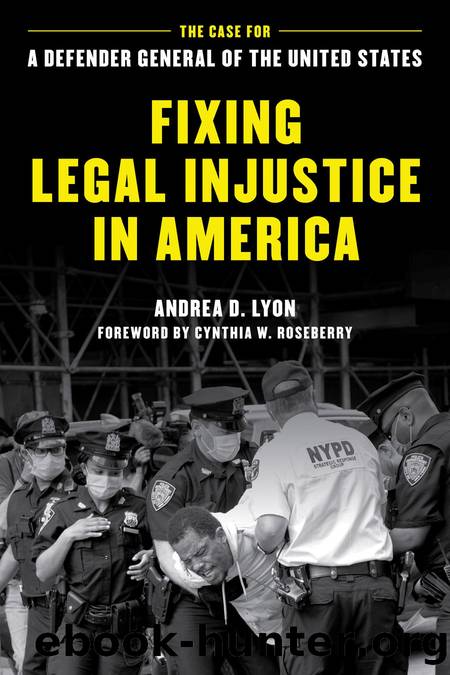Fixing Legal Injustice in America by Andrea D. Lyon

Author:Andrea D. Lyon
Language: eng
Format: epub
Publisher: Rowman & Littlefield Publishers
Published: 2022-05-23T00:00:00+00:00
Thus an unusual coalition was formed: Victimsâ rights groups, who wanted funding spent on their needs, not death penalty trials; fiscal conservatives, who didnât think that Illinois got much âbang for its buckâ; and those of us who wanted the death penalty gone for moral, religious, or philosophical reasons all joined together.3
It is easier to see the cost of âexpensiveâ prosecutions like death penalty cases than it is to see where decisions by prosecutors, police, and, to some extent, judges, affect what we spend and where we spend itâand how shortsightedly we do both. While there are some cases where there is a public outcry to charge someoneâanyone, reallyâand pressure to make the decision to charge and what to charge rapidly, that is not true with most cases. The default position of most prosecutors is to charge the largest possible number of charges, which often results in one act being charged under dozens of legal theories, as well as those that carry the most severe penalties, even if it is clear (or later becomes clear) that it is overchargingâdeliberately charging multiple counts, with knowledge that most charges will fall away as proceedings begin. Overcharging is not specifically prohibited by lawyersâ rules of professional conduct and is is used as a technique for future plea bargaining.4
Overcharging forces individuals into pleas because the risk is just too great. If faced with the death penalty or life without parole, a plea to a lesser chargeâand therefore, less timeâbecomes appealing. Even innocent people âchooseâ the plea, as the risk of going to trial is so astronomical.5
In many situations, there is a price paid by the system, the accused, and their families as a result of thoughtless overcharging and because of a powerful force called inertia. It is difficult for someoneâespecially someone with as much power as the prosecutionâto reconsider a decision that has already been made, even if it was made without much thought.
Take the case of Tess Andrews (not her real name). It wasnât hard to see Tess Andrewsâs pain. It was, quite literally, stamped on her face. When the preliminary hearing judge assigned me to represent her, I stepped up to the bench and glanced at her. She was petite, maybe 5-foot-4, thin but solid, and looked to be in her fifties but was actually only forty-two. She was African American, with medium complexion and short hair that looked like she had been in jail for a whileâwhich she had. But what caught my attention was her face: the round, one-inch burn on her left cheek, maybe two inches below her eye, that I would later learn happened when Carson Andrews (also not his real name) extinguished a cigar there; the scar above her right eyebrow that she told the hospital had come from a fall; and her uneven jaw, as most of her teeth on the left side had been knocked out from another âfall.â
Tess was charged with first-degree murder in Carsonâs death. In Illinois, defendants can be so charged without
Download
This site does not store any files on its server. We only index and link to content provided by other sites. Please contact the content providers to delete copyright contents if any and email us, we'll remove relevant links or contents immediately.
| Antitrust | Civil Law |
| Emigration & Immigration | Federal Jurisdiction |
| Housing & Urban Development | Indigenous Peoples |
| Land Use | Public |
| Public Contract | Public Utilities |
| Urban, State & Local Government |
Killers of the Flower Moon by David Grann(3318)
Machine Learning at Scale with H2O by Gregory Keys | David Whiting(2380)
Will by Will Smith(2128)
Guns, Germs and Steel by Diamond Jared(1914)
Borders by unknow(1816)
The Room Where It Happened by John Bolton;(1742)
Once Upon a Broken Heart by Stephanie Garber(1611)
The Color of Law by Richard Rothstein(1598)
Water Rights and the Environment in the United States by John Burch(1430)
Friends, Lovers, and the Big Terrible Thing by Matthew Perry(1395)
Examples & Explanations: Administrative Law by William F. Funk & Richard H. Seamon(1349)
The Strength In Our Scars by Bianca Sparacino(1343)
A Short History of War by Jeremy Black(1336)
HBR's 10 Must Reads 2022 by Harvard Business Review(1280)
Pharmacy Practice and The Law by Richard Abood(1274)
That Every Man Be Armed by Stephen P. Halbrook(1259)
The Guarded Gate by Daniel Okrent(1249)
515945210 by Unknown(1244)
Injustices by Ian Millhiser(1224)
